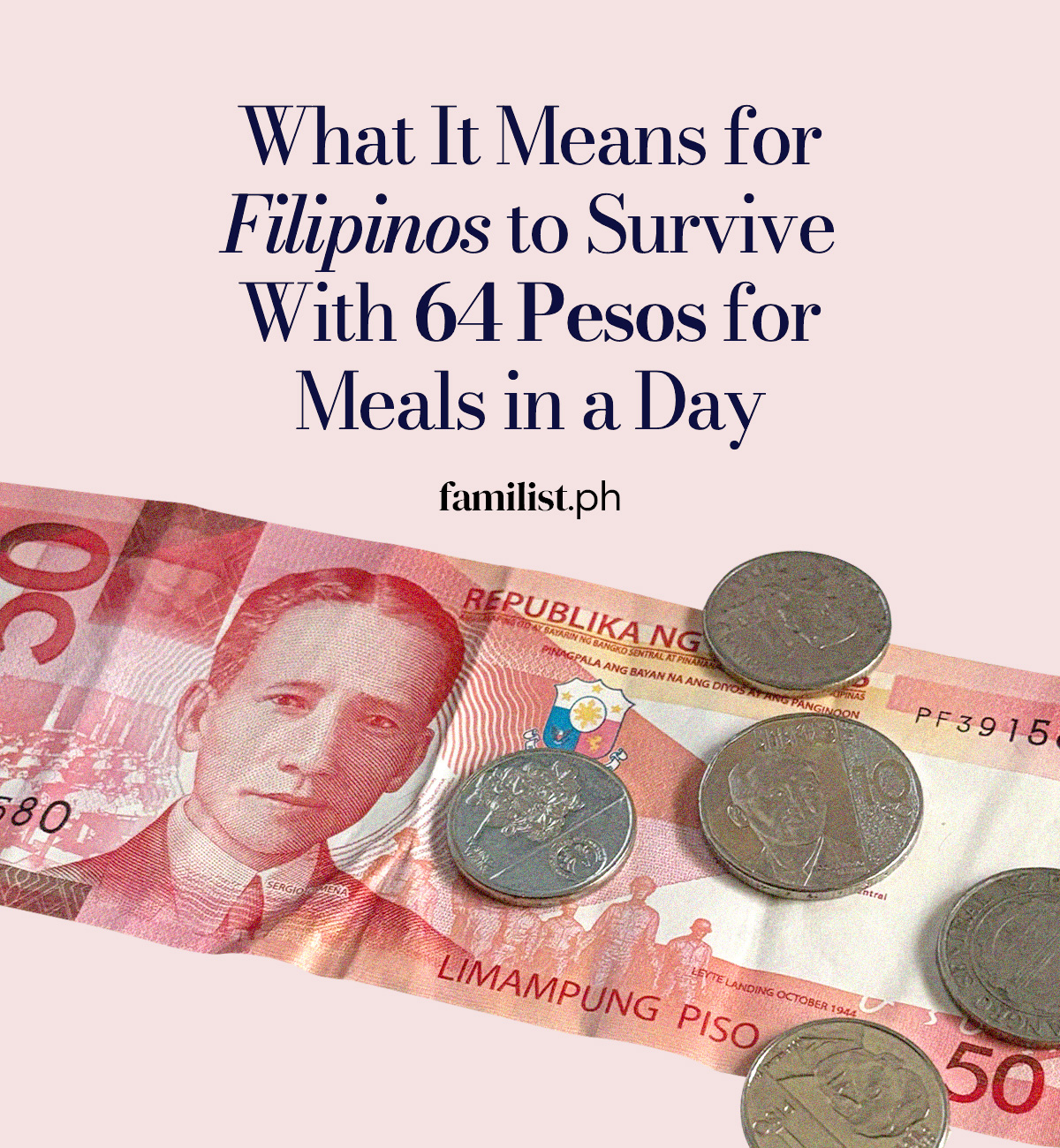I looked at my carbohydrate and protein packed breakfast plate this morning. It was a filling breakfast – I can even get second helpings and make more than one cup of coffee to satisfy my need.
What prompted me to do this is the ₱64/three meals/day (or roughly ₱21 per meal) that the National Economic Development Authority (NEDA) of the Philippines recently declared as the figure for not being “food poor.” Upon hearing it, we all agreed that it’s a far cry from reality. My breakfast, for example, already cost ₱100 at the very least.
What does it truly mean for Filipinos to survive with ₱64 for three meals in one day? Let’s spell it out.


An average Filipino can have breakfast with one sachet of 3-in-1 coffee (₱10) and a few pieces of pandesal (₱2 each). Lunch and dinner can be taken care of a pack of instant noodles (at least ₱10), and two cups of rice bought at a nearby carinderia (₱10 each). A can of sardines (at least ₱20) may be added, too. All in all, this already amount to ₱66-68 pesos.
If a person’s job is physically demanding, this budget allocation is never enough. With restrained eating and meticulous budgeting, ₱64 a day may work – but at the expense of nutrition.
There may be “healthier” options, such as adding vegetables to canned goods, but this would cost more; this also entails that canned goods would become a staple, which should not be the case unless the high sodium content isn’t a concern.
Sixty-four pesos doesn’t even allow fruits, with oranges and apples now sold at ₱25 apiece, and meat such as chicken that sells at least ₱180/kilo.
Food is not only for survival, but also for nutrition. Rethinking the ₱64/day budget means re-evaluating our priorities when it comes to food and nutrition.

There’s a good reason why physiological needs such as water and food need to be satisfied first before other needs, according to Maslow. Safety and security, love and belonging, and self-esteem are a bit of a reach with a grumbling stomach and/or poor nutrition.
For families with five or more members whose only income is the minimum amount at ₱610/day (Metro Manila rate), this is particularly a challenge. Five members need 320 pesos for meals in a day, not including their transportation, kids’ school needs, vitamins and supplements, and others. This entails that there will be nothing left for savings for a rainy day nor of opportunities to grow their money. Many Filipinos don’t even get to buy the very things they’re working hard for.
These altogether is a source of elevated stress and anxiety.

A weak immune system is a consequence of the above two points. Hence, illnesses are inevitable. As also mentioned earlier, a minimum wage earner has little to no budget left for hospitalization, even if it should also be a priority. Health care in the Philippines doesn’t come cheap, and one’s first five to ten minutes in the hospital already accounts for a hefty medical bill.
The ₱64 a meal issue is not an isolated budgeting issue. It has exponential consequences on a family’s health and wellness, too.

It goes without saying that if these are the grave aftermaths of having a measly food budget, additional pressure is on for breadwinners. They won’t just sit around waiting for apples to fall from trees. Knowing the ₱64 does not give the adequate nutrition they and their family need, they’ll be forced more to clock in more work hours.
Some would sign up for side hustles, which equates to less time for rest, and to making the greatest sacrifice of all.

We often read that time with family is the ultimate wealth indicator – when we finally have the luxury to not be in a hurry upon waking up, or when we don’t have to feel guilty about working more hours at home or away from home. When you know your food budget isn’t enough and when prices of commodities are at an all-time high, you’re left with no choice – you sacrifice time with your family so you can make ends meet.
This ₱64/three-meal-allocation issue is more than just about working more so we can have more budget. The Filipinos have been compromising a lot of their priorities, spending time away from their families, and finding more sources of income long before this news broke. Labor has become the Filipinos’ way of life – a vicious cycle of hustling and grinding but not getting what they deserve for themselves and their families in return.
Inflation is bad enough; a weak direction makes the situation even worse.
Filipinos need strong and empathetic leaders who will walk with them especially in a time like this, so they get out of “survival mode” once and for all.
References:
- Hana Bordey, NEDA chief: Persons spending P64 below for 3 meals a day considered ‘food poor’, August 13, 2024
- Prices of Commodities, accessed August 21, 2024
- Saul McLeod, PhD, Maslow’s Hierarchy of Needs, January 24, 2024
- Trading Economics, Philippines Daily Minimum Wages




